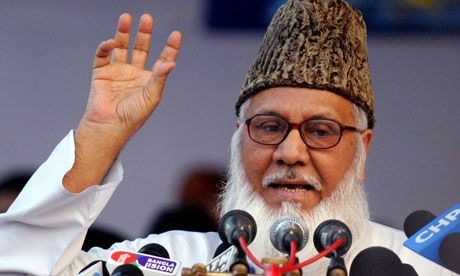The Payback: Bangladesh Sentences Islamist Leader And 13 Others To Hang For Helping Assamese Separatists Smuggle Weapons

A court in Chittagong, Bangladesh, has sentenced 14 people – including the chief of the country’s top Islamic fundamentalist group and various former army and intelligence officers – to death by hanging for smuggling a huge cache of arms on behalf of the United Liberation Front of Assam (ULFA) 10 years ago.
The doomed men include Matiur Rahman Nizami, 70, the chief of Jamaat-e-Islami, Bangladesh biggest Islamic party, and himself a former government minister; and Paresh Barua, the ULFA’s military wing chief. Barua, one of the most wanted militants in India and whose current whereabouts are unknown, was convicted in absentia. Two senior Bangladeshi military officers, Brigadier General Abdur Rahim, the former director-general of National Security Intelligence (NSI), and Major-General Rezzakul Haider Chowdhury, former intelligence boss, also received the ultimate punishment.
"We're satisfied with the verdict. This is an unprecedented case and all those accused have got due justice," prosecutor Kamal Uddin Ahmed told Agence France Presse. All the convicted men were either members of or somehow allied with the right-wing Bangladesh Nationalist Party (BNP), which is now the principal opposition party to the ruling Awami League. The Press Trust of India reported that the trial comprised the country’s biggest weapons case ever and conducted under extremely tight security. A total of 50 people were believed to be involved in the arms conspiracy.
The 10-truck convoy of arms, destined for ULFA hideout camps in Assam, India, were “accidentally” seized in the port of Chittagong in April 2004 while crossing through Bangladeshi territory, in violation of various local laws regarding weapons possession and transfer. (The Indian province of Assam is located northeast of Bangladesh.) According to media reports, Bangladeshi authorities at the time seized and confiscated about 1,500 boxes that contained submachine guns, AK-47 assault rifles, submachine carbines, Chinese pistols, rocket launchers, 27,000 grenades and more than 11 million bullets from the 10 trucks. Local media speculated the weapons originated in Beijing, China, and were illegally smuggled through Hong Kong and Singapore. The sensational case brought together various disparate and murky elements of Bangladeshi and Indian political, military and intelligence forces.
The ULFA, which has been banned in India, has sought independence for Assam since its founding in 1979. Barua leads a breakaway faction of ULFA that is opposed to any negotiations with the Indian government. ULFA has long operated bases and also owned certain commercial interests in Chittagong, a coastal city in southeastern Bangladesh. Prosecutor Ahmed said the verdict confirmed the existence of a conspiracy and "collusion" between members of Jamaat, senior members of the former BNP-led government and intelligence operatives, and the ULFA.
BBC noted that Nizami’s troubles do not end even with this death sentence – he still faces separate war crimes charges related to his activities in the independence war of 1971, which resulted in the creation of the new state of Bangladesh (formerly East Pakistan) from West Pakistan (now Pakistan). Various other Jamaat members have been sentenced to death for charges connected to that war, raising fears that another conviction for Nizami will intensify unrest among Jamaat activists, who call the trials politically motivated. Already, Jamaat and their allies have staged protest demonstrations, strikes and transport blockades over the ongoing trials, resulting in the deaths of scores of people. "We have deployed around 1,000 police and RAB [Rapid Action Battalion] officers to ensure security," Chittagong Police Chief Shafiqul Islam told AFP prior to the verdict.
Bangladesh Prime Minister Sheikh Hasina, of the Awami League, has vowed to punish BNP-linked figures over various changes, leading to accusations that she is conspiring with India in order to stamp out the Islamist presence in Bangladesh. India has supported Hasina’s administration and has reportedly pressured Dhaka to pursue legal actions against BNP and Jamaat leaders for both 1971-related war crimes charges and arms smuggling. Indeed, defense attorney Kamrul Islam Sazzad told AFP that he will appeal the verdicts, citing that they were "politically motivated" and designed for the purposes of “pleasing India.”
Michael Kugelman, senior program associate for South and Southeast Asia at the Woodrow Wilson International Center for Scholars in Washington, commented that the court’s ruling should be regarded with a healthy dose of skepticism. “Over the last [several] months we've seen a series of politically-driven court decisions that convicted members of [Jamaat],” he said.
ULFA has been banned by India since 1990, citing it was a “terrorist group.” Some 18,000 people have died in the conflict related to Assamese separatism. The Daily Star newspaper of Bangladesh reported that ULFA has long enjoyed the support of the BNP government when it ruled Bangladesh. Barua himself was based in Dhaka, granted protection from the BNP, and directly supervised the movement of the arms cache with which he sought to wage a war against India.
Witnesses in the latest trial testified that ULFA had established military training camps in Chittagong, Sylhet, Sherpur and some areas along the porous border with India. When Awami took over Bangladesh, they cracked down on ULFA groups operating in the country. By 2010, ULFA dropped its demands for total independence and agreed to enter into talks with the Indian government (Barua refused to abide by this pact and remains a fugitive from justice).
Kugelman also commented that Jamaat and ULFA don't appear to be a “natural pairing,” though they are both united in their lack of affinity for India. “Given that Assam separatists have sought out Bangladesh as a sanctuary, it's not inconceivable that ULFA has looked to [Jamaat] for its help,” he added.
© Copyright IBTimes 2025. All rights reserved.




















